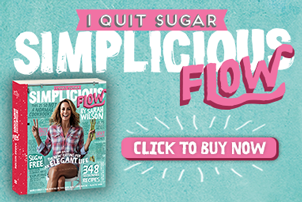There were a few reasons. First, it would take an entire book to explain helpfully how to navigate the convoluted recycling system across states, councils, countries. There is seriously no comprehensive information to impart, because it doesn’t exist. I looked and looked and asked and badgered. No one knows where, if it all, you can recycle a plastic meat tray. For instance. No one knows whether said meat tray will turn up out at sea regardless of whether it’s recyclable in one’s area or not. No one knows. It’s a mess. Which has led one Queensland council to give up on recycling altogether. Perhaps unsurprisingly, a survey of 2000 adults by the British Science Association found that not a single person surveyed could correctly identify what items could and couldn’t be recycled.
Which leads to the second and more important reason:
[click_to_tweet tweet=”I decided that to include a chapter on recycling in Simplicious Flow was to encourage bad behaviour.” quote=”I decided that to include a chapter on recycling in Simplicious Flow was to encourage bad behaviour.”]
Hate. To. Break. It. To. You. Recycling is not an answer. But because we think it is, it becomes a problem.
[click_to_tweet tweet=”The ‘But it’s recyclable!’ cry of avoidance is killing this planet. ” quote=”The ‘But it’s recyclable!’ cry of avoidance is killing this planet. “]
The blind belief that recycling fixes things actually stops us from stepping up as adults and owning the bloody situation. The situation being that the planet is drowning in plastic and other consumerist detritus and that we think “someone else will take care of”.
[click_to_tweet tweet=”Recycling is a farce. The only fix is to pull up our socks and consume less.” quote=”Recycling is a farce. The only fix is to pull up our socks and slap on the badge that says ‘my responsibility’ and consume less.”]
It might not be so sexy, but it’s the only fix. Here, I’ll share a few facts that are worth knowing. My next post this week will be a quiz to up your recycling game..
Recycling reality check:
- Of all the plastic in your kitchen, two thirds cannot be recycled. Meat trays, receipts, beer bottle tops, aluminium foil…the list goes on and on.
- It gets worse. As many of you know, in January 2018, China stopped importing 600,000 tonnes of recyclable paper and plastic from Australia. Similarly, in Europe a shift in environmental policy in China rendered recycling plastic unprofitable. As a result, 70 per cent of potentially recyclable plastic in Europe ends up in landfill, in oceans or are incinerated. The figures for Australia are not known. But, some data suggests the recovery rates are likely to be similar.
- It gets even worse: Even the stuff that makes it to a plant, well, about 30% of it also ends up in landfill due to contamination. Because there is so much confusion as to what can and can’t be recycled (let’s leave aside the fact that many people use their recycling bin as a second rubbish bin), unrecyclable stuff is clogging or “contaminating” the machinery. When it does, the whole load is dumped. Plastic bags filled with recycling, for example, end up going to landfill.
- Thusly, more than 90% of plastic is not recycled. A 2018 EU report estimated that by 2050, the quantity of plastic in our oceans will be greater than the quantity of fish. Just to throw a visual in there.
- Then add this to the picture: Once that plastic bottle or tin can is recycled, bear in mind that the eco cost of creating the repurposed plastic or tin product from recycled materials is only marginally less than producing the original. True and sad story.
- Plastic cannot be recycled infinitely, and after a handful of times it will be discarded, where it will take centuries to degrade. One single water bottle will remain on the planet in some form for a minimum of 450 years.
- Countless studies around the world show young people re the worst/laziest recyclers. This kills me. Young people can we fix this?
So do we just give up?
No. The only real salve to fix this crisis is to buy less. Less stuff means less plastic. Buying less stuff also means you wind up repurposing the bits of detritus you have lying around. Like using your frozen pea packet as a bin liner. The other salve is to use non-disposable products wherever possible. Even – and especially – when it’s inconvenient.
Sometimes I think all this begins with all of us asking whether we’re being real with ourselves. Are we defending our tendency to favour convenience (and our habit of sticking our head in the sand) with the cry, “but it’s recyclable!”? Have you found yourself doing this?


